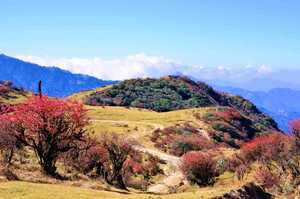Singalila National Park: A Hidden Gem of West Bengal
Cuerpo
Located in the heart of the Eastern Himalayas, Singalila National Park stands as one of India’s most sought-after eco-tourism destinations. Located in the Darjeeling district of West Bengal, the park offers nature lovers and wildlife enthusiasts an opportunity to explore rich biodiversity, mesmerizing landscapes, and a glimpse into the lives of rare and endangered species. Its stunning location, combined with its ecological significance, makes Singalila National Park an unmissable destination for anyone passionate about wildlife, trekking, and nature.
Location and Overview of Singalila National Park
Singalila National Park is located in the northern part of West Bengal, near the border with Nepal and Bhutan. The park covers an area of approximately 78.6 square kilometers and is part of the larger Singalila Range, which is famous for its breathtaking views of the Himalayas. The national park lies at an altitude of about 7,000 feet to 12,000 feet above sea level, offering visitors a unique chance to experience a temperate and sub-alpine climate.
The Singalila National Park is situated primarily in the Darjeeling district of West Bengal. Its proximity to the famous hill stations of Darjeeling and Kalimpong has made it a popular spot for eco-tourism. Travellers from across the world flock to this region for its natural beauty and diverse flora and fauna.
What Makes Singalila National Park Unique?
Singalila National Park is well-known for its extraordinary combination of diverse ecosystems, including alpine meadows, dense forests, and snow-covered peaks. One of its biggest attractions is the vast variety of plant and animal species that call the park home. It’s a perfect destination for wildlife enthusiasts and birdwatchers.
The park is renowned for its trekking routes, which allow trekkers to enjoy the breathtaking beauty of the park while encountering its fascinating wildlife. One of the most famous trekking routes in the park is the Singalila Ridge Trek, which offers spectacular panoramic views of the Kanchenjunga range and allows trekkers to experience the flora and fauna of the region up close.
Singalila National Park: Flora and Fauna
Singalila National Park is famous for being home to a variety of rare and endangered species of flora and fauna. The park boasts more than 1,200 species of plants, including orchids, rhododendrons, and ferns. The richness of plant life in Singalila makes it a perfect destination for botanists and nature lovers alike.
But it is the animals that truly make this national park stand out. Singalila National Park is famous for being home to several endangered species, including the red panda. The park’s dense bamboo forests and alpine meadows offer the perfect habitat for these elusive creatures. The red panda is one of the main attractions in the park, and it is often considered one of the most iconic animals of the region. With its rust-coloured fur and playful demeanour, the red panda has become an emblem of the park’s conservation efforts.
Apart from the red panda, Singalila National Park is also famous for several other animal species that are rare and endangered. These include the Himalayan black bear, clouded leopard, and tiger. The park also serves as an important habitat for musk deer, barking deer, and several species of wild boar.
Birdwatchers are sure to be enthralled by the diverse birdlife in the park, with species like the Himalayan griffon vulture, satyr tragopan, and blood pheasant inhabiting the region. The rich birdlife makes Singalila National Park an important site for conservation efforts and research.
Singalila National Park: Trekking and Adventure
Trekking is one of the most popular activities at Singalila National Park, and it offers some of the best trekking routes in the region. The Singalila Ridge Trek is particularly famous for offering some of the most breathtaking views of the Kanchenjunga mountain range and the surrounding valleys. The trek takes you through dense forests, across ridges, and into alpine meadows, providing the opportunity to witness the park’s unique flora and fauna up close.
For those seeking an even more challenging trek, the Sandakphu Trek, which starts at the base of Singalila National Park, is a popular choice. This trek is famous for its spectacular views of the Himalayan peaks, including Everest, Kanchenjunga, and Makalu. The Sandakphu trek is considered to be one of the most thrilling and rewarding treks in India.
Along the way, trekkers often encounter rare wildlife, including the red panda and other Himalayan species, making the trekking experience even more memorable. The park’s biodiversity, combined with the stunning mountain views, makes it a popular destination for nature lovers and adventure enthusiasts.
Singalila National Park: Conservation Efforts and Challenges
The Singalila National Park is not just a haven for wildlife, but it also plays an important role in the conservation of several endangered species. The park is a designated red panda sanctuary, and various conservation programs are actively working to protect the habitats of these rare animals. Several local and national NGOs, along with the government, are involved in creating awareness about wildlife conservation and ensuring that the park’s delicate ecosystem is preserved for future generations.
Despite the park’s efforts to protect its biodiversity, it faces several challenges. One of the primary concerns is human encroachment, which poses a threat to the habitats of species such as the red panda. The increase in tourism and the surrounding community’s need for land also put pressure on the park’s ecosystems. However, continued efforts by conservationists, along with sustainable tourism practices, have helped mitigate these issues.
How to Reach Singalila National Park
Reaching Singalila National Park is relatively easy, thanks to its proximity to Darjeeling. The nearest major airport is in Bagdogra, which is approximately 90 kilometres away from the park. From Bagdogra, travellers can take a taxi or bus to reach Darjeeling, and then proceed to the park.
The nearest railway station is also in New Jalpaiguri, from where visitors can catch a taxi or bus to Darjeeling and then head to the park. For those travelling by road, there are well-connected roads from major cities like Kolkata, Siliguri, and Darjeeling to the park.
Singalila National Park: A Hidden Treasure in West Bengal
Singalila National Park is a treasure trove for nature lovers, wildlife enthusiasts, and trekkers alike. Its stunning landscapes, rare flora and fauna, and unparalleled views of the Himalayas make it one of the most sought-after destinations for eco-tourism in India. With its rich biodiversity and cultural significance, the park offers a unique opportunity to experience the natural beauty of the Eastern Himalayas in all its glory.
Whether you are looking to witness the elusive red panda, trek through the majestic Singalila Range, or simply enjoy the serenity of nature, Singalila National Park promises an unforgettable experience for all who visit.











Comentarios